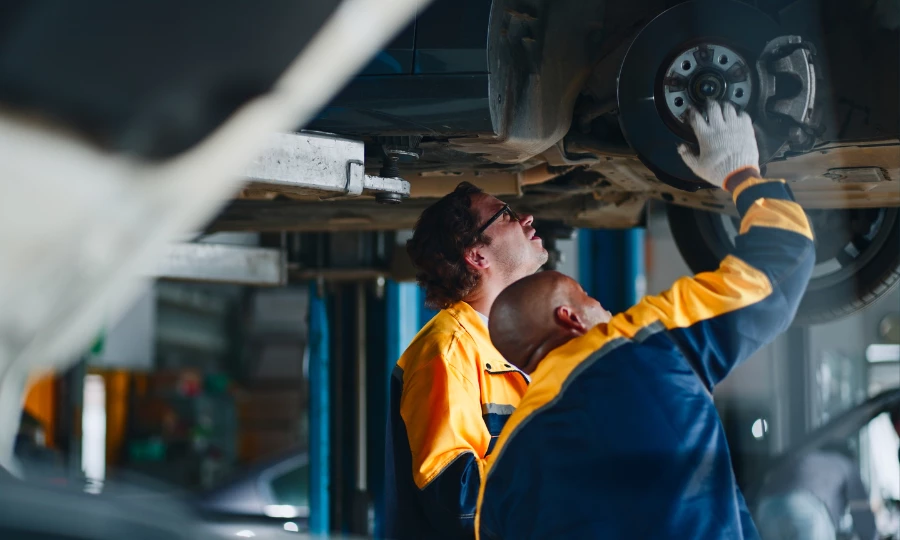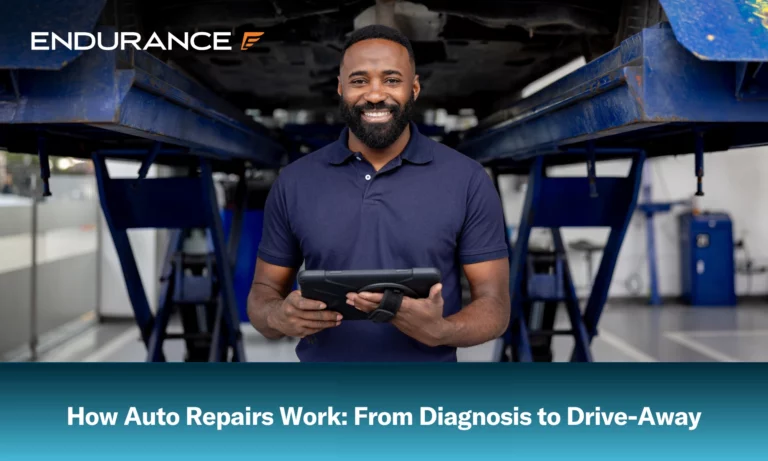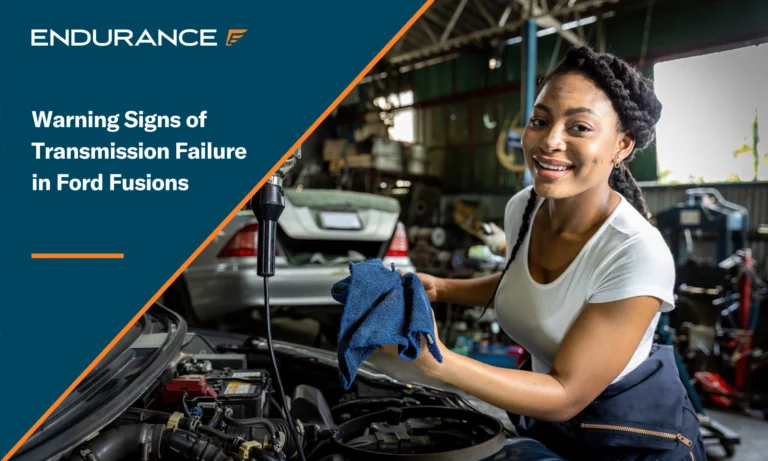Why Is My Car Shaking While Driving?

Driving a car that shakes can be unsettling. Not only is this problem annoying, but it’s a warning that your vehicle needs immediate attention. In most cases, these vibrations are due to common problems that every car owner should know. Keep reading as we walk you through these issues, the usual symptoms, and the cost of repairs.
Common Causes of Car Shaking
Unlike some vehicle troubles, car shaking can be attributed to several problem areas. The trick is narrowing down the source to determine the severity level and typical repairs. With that said, car shaking is never good, so repairs should be conducted immediately to prevent a driving hazard and minimize the chance of more damage. Here’s a look at frequent culprits, including symptoms and repair costs. Unless mentioned otherwise, prices for service work are based on RepairPal estimates.
#1. Tire Issues
Unbalanced Tires
Unbalanced tires are a common cause of vehicle vibration, as potholes and other road imperfections can upset ideal tire weight distribution. One red flag is the steering wheel shaking at higher speeds (50 mph and above).
Symptoms to watch for:
- Vibration that increases with speed or seems to improve at certain speeds
- Steering wheel shaking primarily at highway speeds
- Uneven tire wear
Assuming that tire replacement isn’t required, correcting unbalanced tires is a relatively inexpensive fix, under $50, assuming no additional work is necessary. Ignoring the problem can lead to premature tire wear and suspension damage.
Damaged or Worn Tires
Damaged or worn-out tires can lead to significant vibrations outside of balance problems. Separated treads, sidewall bulges, and flat spots can create shake-inducing imbalances (in addition to being safety hazards). Tires nearing the end of their life due to use or age can also trigger shakes.
Symptoms to watch for:
- Visible tire damage or irregular wear
- Vibration that persists at all speeds
- Vehicle pulling to one side while driving
- Increased tire noise when in motion
A replacement tire costs $100 to $375, including installation labor. Depending on the problem and vehicle, you may need to replace all four tires.
#2. Brake Problems
Warped Brake Rotors
Vibrations during braking are usually caused by warped brake rotors. This problem arises due to extreme heat generated during braking (such as aggressive or excess braking or braking during downhill driving). Rotors will eventually wear out with regular use.
Symptoms to watch for:
- Car vibrates when braking
- Pulsing brake pedal
- Steering wheel shake during braking
- Squealing or squeaking noises when the brakes are applied
Expect to pay $321 to $412 per axle to replace brake rotors. Depending on the condition, rotors can sometimes be resurfaced instead of replaced, saving money.
Sticking Brake Calipers
Brake calipers are often ignored until something goes wrong. These crucial components apply the brake pads against the rotors, creating friction to slow or stop the car. Calipers can deteriorate due to time, corrosion, or improper maintenance. When a brake caliper starts to stick, a vibration can occur, and the vehicle will pull to one side. As with all braking issues, a sticking caliper requires prompt attention due to safety concerns.
Symptoms to watch for:
- Continuous vibration that worsens with speed
- Vehicle pulling to one side
- Burning smell from the affected wheel
- Excessive brake pad wear on one side
Replacing a single brake caliper costs about $800. This high price is due to the time-consuming process of bleeding the brake system.
#3. Wheel or Hub Trouble
Bent Wheels or Rims
Modern car wheels, especially those made of aluminum alloy, are especially vulnerable to damage from potholes and curbs. A bent wheel can be another leading cause of shaking and vibrating while driving. While wheels can sometimes be straightened, replacement is often the remedy.
Symptoms to watch for:
- Constant vibration at all speeds
- Visual wheel damage
- Tire pressure problems
- Vibration onset after hitting an obstacle
The average cost to replace a damaged wheel with a matching unit is between $878 and $890, but specialty wheels can cost four figures.
Worn Wheel Bearings
A wheel bearing in good condition ensures smooth wheel rotation. However, these components wear out, especially in higher-mileage vehicles. A worn bearing is a sure-fire trigger for vibrations and a significant safety issue.
Symptoms to watch for:
- Grinding noise that changes with vehicle speed
- Vibration that changes when turning or changing lanes
- Uneven tire wear
- Loose or wobbly wheel feeling
The replacement cost for a single wheel bearing assembly runs from $283 to $377.
#4. Suspension System or Steering System Faults
Worn Suspension Components
A vehicle suspension comprises numerous components, such as ball joints, tie rods, and control arm bushings. These parts wear out regardless of the vehicle, causing vibrations and handling problems.
Symptoms to watch for:
- Clunking noises over bumps
- Vibration that worsens on rough roads
- Uneven tire wear
- Loose or wandering steering feel
Suspension repair costs vary widely depending on the specific components needed. Simple repairs can run $200 to $400, but more involved work can reach $1,500 or more.
#5. Misaligned Wheels
Wheel alignment problems cause vibration, uneven tire wear, and handling issues. It’s a common issue after hitting a pothole or curb, or occurring through normal driving over time. Regular wheel alignments should be part of an ongoing maintenance program to catch trouble early on. Tire replacement should also include a wheel alignment.
Symptoms to watch for:
- Vehicle pulling to one side
- Uneven or rapid tire wear
- Off-center steering wheel
- Vibration at higher speeds
Wheel alignment service usually costs between $136-$172.
#6. Drivetrain Problems
Worn CV Joints or Driveshafts
Constant velocity (CV) joints and driveshafts transfer power from the transmission to the drive wheels. When these components wear out, they can cause significant vibration, especially during acceleration.
Symptoms to watch for:
- Clicking noise when turning
- Vibration that increases with speed
- Shuddering during acceleration
- Grease leaks around wheel areas
Replacing a CV joint costs $1,117 and $1,165 per side. Meanwhile, a new driveshaft will cost $642 to $2,331 depending on the car, reports Your Mechanic.
Bad Engine or Transmission Mounts
Engine motor mounts and transmission mounts secure these major components to the vehicle’s frame. Vibration, especially during idling, is a symptom of mount failure.
Symptoms to watch for:
- Excessive engine movement
- Engine vibration at idle that smooths out with high speeds
- Clunking noise during gear changes
- Vibration that increases with engine load
Expect to pay $504 to $562 to replace the engine mounts (usually, swapping out all the mounts at the same time is recommended). Replacing the same components for the transmission runs $297 to $329.
#7. Engine Malfunction
Misfiring Engine
Engine misfires occur when the normal combustion cycle is disrupted. There can be several causes, ranging from problems with the engine valves and crankshaft to issues with the fuel supply.
Symptoms to watch for:
- Check engine light
- Rough idle
- Loss of power, including hesitation or stalling
- Vibration that changes with engine speed
Repair costs vary significantly depending on the cause. Changing the spark plugs costs $220 to $281. More extensive work, such as repairing the valve train or replacing the crankshaft, can run into the thousands.
Vacuum Leaks
A vacuum leak occurs when unregulated air enters the engine, impacting the normal air-to-fuel mixture essential for proper combustion and engine operation (it can also cause a misfire). Shaking is just one indicator of a vacuum leak.
Symptoms to watch for:
- Rough idle
- High idle speed
- Whistling noise from the engine
- Reduced fuel economy
Vacuum leak repair starts at around $100, but hard-to-detect leaks and difficult-to-access vacuum lines can increase costs to $500 or more.
When to Seek Professional Help
 A vibrating car is a clear signal that there’s a problem. Ignoring this trouble will only worsen matters, as a simple repair can become more extensive (and expensive). In addition, a shaking vehicle can quickly transform into a safety issue, putting occupants and other motorists at risk.
A vibrating car is a clear signal that there’s a problem. Ignoring this trouble will only worsen matters, as a simple repair can become more extensive (and expensive). In addition, a shaking vehicle can quickly transform into a safety issue, putting occupants and other motorists at risk.
Determining when to visit a mechanic comes down to your answers to these frequently asked questions:
Is Safety at Risk?
It’s best to avoid driving a car that’s not in top operating condition. This approach is critical for trouble involving the engine, transmission, brakes, steering, or suspension, which require immediate attention.
Can You Diagnose the Problem?
Repairs should be left to a professional unless you can identify and fix the source of the trouble yourself. Guessing what’s wrong, or worse, making uninformed DIY repairs, is a recipe for disaster.
Does the Repair Require Special Tools or Skills?
Even if you have a good idea about what’s causing your car to shake, such knowledge doesn’t matter much if you don’t have the equipment and ability to make repairs. Modern automobiles are complex machines, and troubles like engine misfires can be especially challenging, even for a seasoned technician.
A Peace of Mind Advantage
Car troubles are stressful, let alone the possibility of a breakdown and surprise repair bills. Car owners with an Endurance Warranty auto protection plan have a built-in benefit: convenient access to the RepairPal network of certified shops. Not only are these facilities vetted for skills and professionalism, but these verified businesses stand behind their work with a minimum warranty on work for 12 months or 12,000 miles.
Importantly, Endurance customers can choose from any licensed repair shop for covered repairs. This perk includes specialty repair centers and dealership service departments.
Endurance Warranty Coverage for Mechanical Issues
Having Endurance Warranty means not having to go it alone when trouble like shaking and vibrations hit. This coverage is well-suited for vehicles no longer protected by a factory warranty and owners looking to have greater control over car repair costs.
Endurance offers a range of extended warranty programs (also called auto protection plans or vehicle service contracts), ranging from essential powertrain protection to options similar to a new car bumper-to-bumper warranty. Endurance also has plans for high-mileage cars, commercial-use vehicles, and select luxury models. In addition, Endurance plan holders are protected by 24/7 roadside assistance (including towing), trip interruption services, rental car reimbursement, and other perks.
Prepare for the Unexpected with an Endurance
No driver anticipates a vibrating car, but having an Endurance Warranty plan can reduce the worry. Learn more by requesting a FREE quote or visiting the Endurance online store for instant price and plan details. Endurance plan advisors are also available for personalized assistance; just call (800) 253-8203.
Additional resources are available through the Endurance blog. This vast library of articles covers numerous topics, including car repair insights, DIY advice, warranty tips, car reviews, and more.













Since the age of 16, Keith has been immersed in the automotive industry, beginning his career by helping his dad fix vehicles at a young age. Keith now owns his own family-run, ASE Certified repair shop, A+ Autocare. At his shop, he focuses on building trusting relationships with his community through exceptional customer service. Read more about Keith.